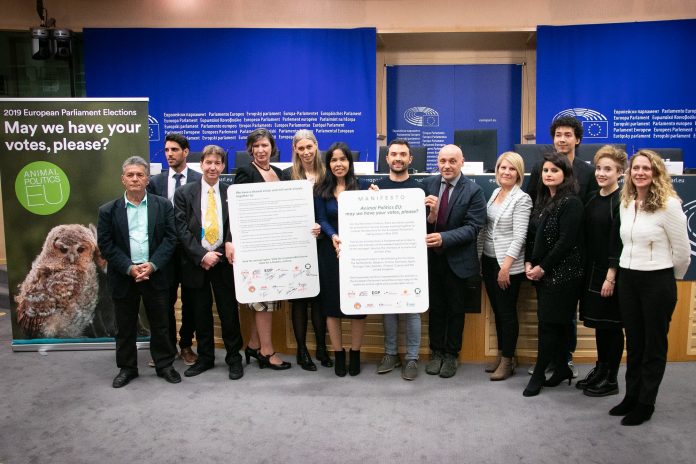For the first time in history, as many as 11 parties for animals from across Europe are preparing to participate in the European Parliament elections. International movement Animal Politics EU consists of the Party for the Animals in the Netherlands and its ten European sister parties from Belgium, Germany, Finland, Sweden, France, Spain, Portugal, Italy, Cyprus, and possibly the United Kingdom. On Thursday, April 4 they presented their collective manifesto called “Animal Politics EU: May we have your votes, please?” in a press conference at the European Parliament.
Parties for animals share a fundamental principle to protect the interests of the weakest against the might of the strongest. Serving the interests of humans and animals alike.
The parties say that gaining greater political representation for animals in the European Parliament would be a major step in the battle for animal rights and a sustainable future.
According to their collective Manifesto the parties will fight for:
- Raise the moral and legal status of animals
- Improve the welfare of animals kept for farming purposes and ensure proper enforcement of animal welfare legislation across all EU member states
- Phase out farming practices which are harmful to animals and re-direct EU subsidies away from the intensive livestock industry, into sustainable, plant-based and organic agriculture
- End the cruel long distance transport of live animals within and outside the EU
- Stop overfishing within and outside European waters
- Phase out animal testing with binding targets for reduction and replacement, combined with incentives for alternative testing methods
- End legal derogations and subsidies for so-called cultural and religious traditions that involve cruelty to animals, such as bullfighting, non-stun slaughter and foie gras production
- Fight the illicit trade of pets in the EU and halt the barbaric treatment of stray dogs and cats in Europe
- Implement a ban on hunting and prohibit the import of wildlife trophies
- Close all fur farms in Europe and ban fur imports from third countries
- Take hazardous pesticides and endocrine disrupting chemicals o the market
- Combat climate change by supporting a shift towards a plant-based lifestyle, implementing a
- CO2 tax for companies and speeding up e orts to realise a complete switch to renewable energy
- Realise efficient, affordable and accessible public transport, as an alternative to air travel
In 2014, the Dutch Party for the Animals and the German party Mensch, Umwelt, Tierschutz were the first parties for animals ever to gain a seat in the European Parliament. Anja Hazekamp and Stefan Eck are respectively the two pro-animal rights MEPs
“In more and more countries, animals are given a voice in politics, which reflects the growing resistance to the way animals are treated. Our growing international movement is consistent in protecting human as well as animal interests,” says Anja Hazekamp MEP.
Their representatives said that according to the polls the movement will likely gain 5 to 7 seats in the forthcoming European Parliament elections. They estimate that PACMA in Spain could elect two MEPs, the Partij voor de Dieren in the Nederlands up to two, the Partei Mensch, Umwelt, Tierschutz in Germany 1-2 and the Portuguese PAN 1. This means the animal rights movement in the European Parliament could triple in size.
The member parties of the movement are as follows: PACMA (Spain), PAN (Portugal), Animal Party Cyprus, Partito Animalista Italiano, Parti Animaliste (France), Partij voor de Dieren (Nederland), DierAnimal (Belgie), Djurens Parti (Sweden), EOP (Finland), Partei Mensch, Umwelt, Tierschutz (Germany), Animal Welfare Party (UK)

